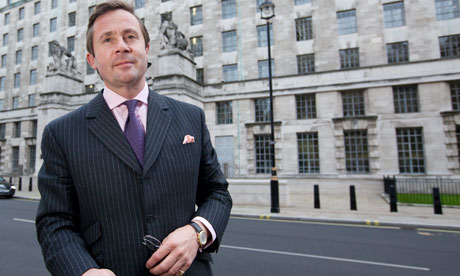MoD's resistance to human rights in Iraq blamed for death of Baha Mousa
Ex-legal adviser Nicholas Mercer accuses ministry of moral ambivalence and cultural resistance to human rights
- guardian.co.uk, Thursday 24 November 2011 19.02 GMT
- Article history

The army's former chief legal adviser in Iraq has accused the Ministry of Defence of moral ambivalence and a cultural resistance to human rights that allowed British troops to abuse detainees and beat the Basra hotel worker Baha Mousa to death.
Lieutenant Colonel Nicholas Mercer, now an Anglican priest, spoke exclusively to the Guardian in the week he was presented with an award by the civil rights group Liberty, and the appeal court threw the MoD into turmoil over the latest allegations of ill-treatment by troops in Iraq.
Mercer's advice on how British soldiers should treat prisoners was repeatedly ignored. Instead, he was effectively suspended – "sent into the wilderness," as he puts it.
After the abuse of many Iraqi detainees, the deaths of others in the custody of British troops, and millions of pounds spent on compensation to Iraqi families – all of which, he says, could have been avoided – he was vindicated in 2009 by the supreme court, which upheld the advice Mercer had given six years earlier: that British troops occupying a foreign country were bound by the Human Rights Act.
In his interview with the Guardian, Mercer painted a devastating picture of the MoD. Referring to the "sheer arrogance" of senior officials and lawyers, he felt as though he was controlled by "a long screwdriver at the top".
The ministry resisted the demands of the Human Rights Act "at every twist and turn".
By "moral ambivalence", Mercer added, he was pointing to how the MoD allowed the argument to fester over what standards British troops should abide by. "The festering," he said, "ended with a man beaten to death."
In March 2003, six months before Mousa's death, Mercer advised that a judge be sent to Iraq to monitor the handling of prisoners. "My job was to protect soldiers from legal proceedings and the degradation of human beings," Mercer said.
"I don't think the UK government wanted a judge for fear of what he might find. The last thing it wanted was independent judicial oversight."
Yet the presence of a judge could have prevented the deaths and injuries. Asked if Mousa would still have been alive, Mercer replied: "I think it highly likely."
Mercer is not short of epithets to describe MoD officials that he had to deal with – cavalier, high-handed, belittling and patronising are among them.
He was told that his opinion differed from that of the government – and in such cases the government's view had to prevail.
"But I am not a ventriloquist, my job was to protect [British] commanders" and to make sure they kept "to the right side of the law," said Mercer.
Days after the invasion of Iraq in March 2003, Mercer saw some 40 detainees lined up with sandbags on their heads. It was "a bit like seeing pictures of Guantánamo Bay for the first time", he told the Baha Mousa inquiry last year.
He had a "massive row" with the commander of the Queen's Dragoon Guards about the army's legal obligations under the Geneva conventions and the European convention on human rights. Hooding and stress positions had been specifically banned by the British government in 1972.
Mercer walked out of a meeting between British officials and the International Committee of the Red Cross after being told by an MoD ministerial adviser to keep his mouth shut.
Mercer told the inquiry that Martin Hemming, his boss in London and the head of the ministry's legal service, threatened to report him to the Law Society.
In his report published in September, the inquiry chairman, Sir William Gage, a former appeal court judge, singled out Mercer's evidence for praise.
The last straw for Mercer was when he was posted as legal adviser in Britain's sovereign base areas in Cyprus. He was defending a soldier accused of driving over the limit.
The breathalyser was defective and soldiers had not been told about a change in the alcohol limit. The MoD hired a QC from the UK at a cost of £60,000, and the defendant's commander met the judge the night before the trial.
In 2007, the MoD complained about Mercer's handling of the case, and he was suspended – "fatally wounded", as he puts it. Mercer found solace, during what he calls his "long journey", in his theological training.
It was only last year that military intelligence interrogators were trained in UK and human rights law as interpreted by Mercer and now imposed by the courts.
The MoD is learning a "very long hard lesson", Mercer said. That it is still learning is evident from the appeal court's ruling this week that the body which the MoD has set up to investigate new allegations of misconduct by British troops was not sufficiently independent, and was in breach of human rights obligations.

No comments:
Post a Comment